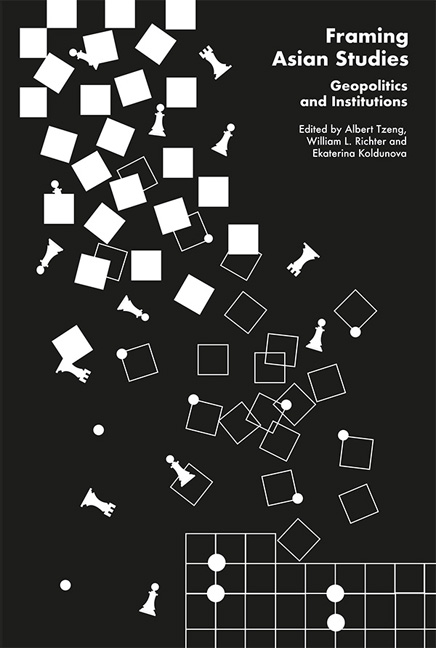Book contents
- Frontmatter
- Contents
- Foreword
- The Contributors
- 1 Introduction: Framing Asian Studies
- I Contested “Asia”
- 2 From Oriental Studies to Asian Studies: The Metamorphosis of the Western Mind
- 3 Geopolitical and Social Framings of Australia's “Asia Literacy”
- 4 Maps as Illustrations and Logos: Geopolitical Construction of Asia and South Asia
- II Geopolitical Framing of Western Discourse
- III Asian Studies in Former Soviet States
- IV Inter-Asian Gazes
- Index
2 - From Oriental Studies to Asian Studies: The Metamorphosis of the Western Mind
from I - Contested “Asia”
Published online by Cambridge University Press: 28 June 2018
- Frontmatter
- Contents
- Foreword
- The Contributors
- 1 Introduction: Framing Asian Studies
- I Contested “Asia”
- 2 From Oriental Studies to Asian Studies: The Metamorphosis of the Western Mind
- 3 Geopolitical and Social Framings of Australia's “Asia Literacy”
- 4 Maps as Illustrations and Logos: Geopolitical Construction of Asia and South Asia
- II Geopolitical Framing of Western Discourse
- III Asian Studies in Former Soviet States
- IV Inter-Asian Gazes
- Index
Summary
Oriental Studies, generally speaking, is understood as knowledge of Asian cultures, languages and people. Asian Studies, too, is concerned with Asian people, culture, history, and, predominantly, politics. Conceptually, Oriental Studies developed over a long period beginning in the late sixteenth century. The heyday of Oriental Studies was the colonial period, when a number of Eurocentric scholars set forth to interpret the mind and manners of the people living in the East. However, due to overindulgence in cultural relativism and occidental high-handedness in interpreting the Orient, Oriental Studies (in general) and orientalists (in particular) were severely criticized. A shift from traditional Oriental Studies to contemporary Asian Studies started happening after World War II, more precisely during the Cold War. Twentieth century Euro-American scholars realized that Asia was never a monolithic oriental entity. On the contrary, the continent is characterized by sharp regional differences, plural cultures and heterogeneity.
Eurocentric scholars divided the globe in two: East–West, Orient– Occident, civilized–uncivilized — and religiously maintained the difference between “us” and “them”. They viewed the Orientals or the Asiatics as “exotic beings”, the specimens of which were to be scrutinized by the “civilized” West. Europeans came, saw and conquered much of the Orient, and felt it necessary to study the mind and manners of the Orientals, not simply to satiate their thirst for knowledge (episteme) but also to hone practical intelligence (phronesis) to administer their colonies. In the process, “Oriental Studies” continued for over three centuries, till it was remodelled and rechristened as Asian Studies, beginning in America in the mid-twentieth century. In essence, Europe led in the creation of Oriental Studies while America pioneered Asian Studies.
Americans joined the league of orientalists in the nineteenth century with the formation of the American Oriental Society in 1842. Since America had no colonies at that time in the Orient, initially the approach of the American orientalists was humanistic. The North American orientalists were engaged in basic research in the languages and literatures of Asia. Traditionally, such research included philology, literary criticism, textual criticism, palaeography, archaeology and the history of oriental civilizations. However, American interest in the Orient took a sharp turn, both qualitatively and quantitatively, during and after World War II.
- Type
- Chapter
- Information
- Framing Asian StudiesGeopolitics and Institutions, pp. 20 - 43Publisher: ISEAS–Yusof Ishak InstitutePrint publication year: 2018



